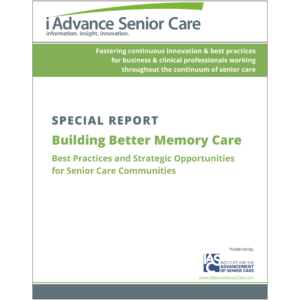Fostering friendships in LTC
Residents need more stimulation than just cursory conversations with caregivers. They need each other. A recent study in The Journals of Gerontology looked at the issue of social engagement in assisted living and noted several factors that affected how deeply residents interacted with each other. Whether possessing a reticent or outgoing personality, residents’ lives are enriched by mutual interaction.
Even if I was mobility challenged, I couldn’t imagine spending each day alone in my unit with only a television for company, leaving it only for a trip to the dining room. Yet some residents—mobility challenged or not—spend a lot of time alone. Of course, you can’t make someone do what they don’t want to do. Some people enjoy their own company. On the other hand, some residents are more gregarious and live more outgoing, dynamic lifestyles.
 Generally, most of the resident-to-resident interactions were positive according to survey results. Residents expressed care and concern for one another. If a wheelchair-bound resident needed some help with directions, menu selection and the like, another resident was happy to assist.
Generally, most of the resident-to-resident interactions were positive according to survey results. Residents expressed care and concern for one another. If a wheelchair-bound resident needed some help with directions, menu selection and the like, another resident was happy to assist.
It was discovered that because not all assisted living communities are permitted to provide aging in place, friendships ceased when a person had to transition to skilled care.
Some ways a community can encourage positive interactions among residents are through creative programming, design and even table seating as indicated in an Assisted Living Federation of America (ALFA) release.
Staff also plays a major role in encouraging and initiating these friendships. Introduce a shy resident to a talkative group or one with similar interests. Knowing who your residents are through assessment can help determine your social strategies and recommendations for resident social involvement.
However, as a former AL family member, if someone is resistant, don’t force the issue. The person eventually might come around and participate on his or her own terms. For some people, just sharing dinner conversation is enough.

Sandra Hoban was on I Advance Senior Care / Long-Term Living’s editorial staff for 17 years. She is one of the country’s longest-serving senior care journalists. Before joining Long-Term Living, she was a member of the promotions department at Advanstar Communications. In addition to her editorial experience, Sandi has served past roles in print and broadcast advertising as a traffic and talent coordinator.
Related Articles
Topics: Activities











